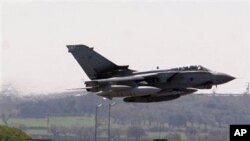The government of British Prime Minister David Cameron has been a major advocate for military action against Libya, but the decision has been a controversial one. The British public is torn about whether or not the no-fly zone over the North African country is a wise course of action, for a variety reasons.
In a poll conducted by The Sun newspaper, less than half of the respondents said they support military action over Libya. That is fewer than those who supported action in Iraq in 2003.
The experience in both Iraq and Afghanistan has left a country weary of war.
But there have been no widespread street demonstrations or actions by the public to loudly condemn the bombing missions conducted by British forces in Libya - as there were against British involvement in Iraq.
One difference this time is that ground troops are not involved. Another is that there is a clear United Nations resolution approving the no-fly zone to protect Libyan civilians against leader Moammar Gadhafi's forces. And perhaps crucially for many, there is widespread support in the Arab region for the coalition effort.
Prime Minister Cameron brought up the issue at the House of Commons.
"The clear support is there from the secretary general of the Arab nations. I also had a meeting with the Saudi foreign minister yesterday," Cameron said. "And I believe support in the Arab world, not just amongst Arab leaders but amongst the Arab people for saving lives in Libya is very strong."
Finally, there is another key reason why the British are not being more vocal about anger concerning Libya: the economy.
Many Britons who this week saw the release of a budget that includes sharp spending cuts and tax hikes are more concerned about their jobs and bank accounts than international stories.
That, however, could backfire for the ruling Conservative party if the cost of British involvement in Libya continues to rise at a time when services back home in Britain are being slashed to meet an austere budget.
Controversy Surrounds British Support for Military Action in Libya












